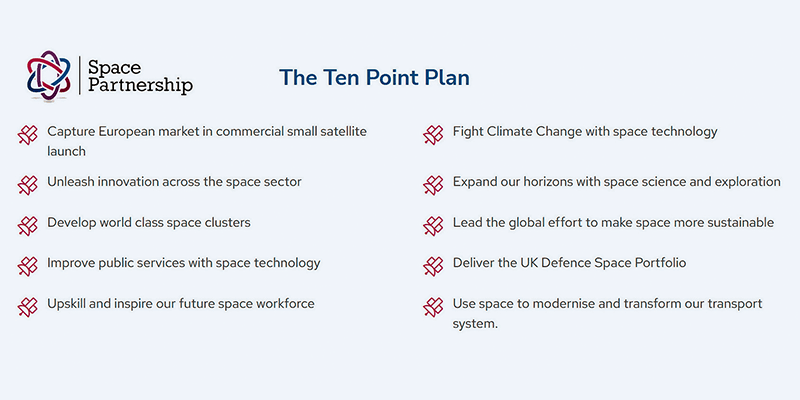To realise the ambitions set out in the National Space Strategy(1), moves are underway to forge closer links between industry, academia and government

The launch of the Space Partnership in November of last year came in the wake of a National Space Partnership (NSP Pilot) that ended in March of last year and builds on the work undertaken by the Space Growth Partnership since 2016.(2)
The NSP Pilot phase concluded that a model which is broad, continuous and embraces knowledge and expertise from across whole UK space sector is vital to the success of future space policy. And with the stated intention to increase the UK’s share of the global space market to 10% by 2030 - a market estimated to be worth around £400 billion - the partnership model will be integral to delivering economic growth.
Working with the recently-established BEIS Space Directorate and the National Space Board, the Space Partnership will focus on delivering a 10-point plan (see below).
In helping to shape and set direction for UK space policy, the Space Partnership will foster cross-community links, identify opportunities, and develop tangible proposals that support the nation’s strategic space goals and ambitions. Central to the success of the Space Partnership will be a small, independent team of dedicated experts led by a Space Partnership Director, the recruitment of which is currently underway. The team will be supported by secondees from the sector, co-funded by the UK Space Agency, and hosted by the Satellite Applications Catapult.
The interim Space Partnership Board is chaired by Graham Peters, Managing Director of Government Services Arqit, who has 30 years of experience in space and defence, operating at the intersection between business, technology and applications.
In announcing the move, Minister for Science, Research and Innovation, George Freeman, said: “Our £16.5bn space sector delivers huge benefits to the UK’s economy and society, and to ensure we deliver the key ambition of our National Space Strategy – to grow an innovative commercial space industry – it is essential that the space community works collaboratively across the whole sector; bringing together researchers, policymakers, small companies and industry. Our £1.5m funding for the Space Partnership, through the UK Space Agency, is a sign of our commitment to build a broader UK space sector, drawing on expertise across companies – big and small – in the industry to seize the many opportunities ahead”
For more information, please visit https://www.spacepartnership.o...
UK Earth Observation: ready to rocket?
The launch of The Space Partnership coincided with publication of the House of Commons Science and Technology Committee’s latest report on the ‘UK Space Strategy and UK Satellite Infrastructure’.
The 90-page document highlights the strength of the UK’s world-leading satellite Earth Observation (EO) sector, with more than 100 companies contributing £100 billion to national economic activity.
Even so, the Committee sets out a number of challenges and concerns. These include the lack of a sovereign satellite EO capability and support for building and deploying UK EO satellites and technologies, as well as a lack of clarity on the UK’s future role within the EU Copernicus programme. It notes that the UK Space Sector is in favour of continued participation in Copernicus but expresses concerns at ongoing disputes over implementing the Brexit arrangements.
Details of the Committee’s views and recommendations on these and other issues can be found at https://committees.parliament....
(1) https://www.gov.uk/government/...
(2) https://www.ukspace.org/space-...


